Middle English
This is part 3 of a section about Middle English
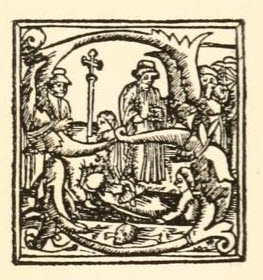
Vision of Piers Ploughman, to which some other writer afterward added The Creed, Is a satirical poem written in alliterative verse. Together they form a national work, the first great original work in English literature. Neither the Vision nor the Creed has much coherence of plan, but the latter has more than the former. Langland was a humane satirist, and his purpose was to set forth the wrongs of his humbler countrymen, suffered at the hands of nobles and priests and lawyers, but chiefly at those of the priesthood. He gave voice to the sorrow, the shame, and the subdued indignation of a deceived, oppressed, and pillaged people. The tiller of the soil, from whose labors nearly all wealth springs, and who then, as often since, starved amid the food that he raised for others, found in him an advocate, and the grasping noble and the corrupt churchman a just judge and a pitiless satirist. The pathos and the humor of his work are not less remarkable than its causticity. It is in these respects, as in all others, thoroughly English in its tone and character; and as an exposition of popular feeling, and no less a picture of contemporary manners, it has not a superior in the whole range of literature. The following brief passages * are characteristic of the author's style and of his subject-matter:
And thanne cam Coveitise kan I hym naght discryve,
So hungrily and holwe sire Hervey hym loked.
He was bitel-browed and babber-lipped also,
With two blered eighen as a blynd hagge;
And as a lethern purs lolled hise chekes Wel sidder than his chyn thei cheveled for eldc;
And as a bondman of his bacon his berd was bi-draveled, With an hood on his heed a lousy hat above And in a tawny tabard of twelve wynter age,
Also torn and baudy and ful of lys crepyng But if that a lous couthe han lopen the bettre,
She sholde noght han walked on that welthe so was it thred-bare. Vision, Passus v.
And as I wente by the way wepynge for sorowe I seigh a sely man me by opon the plough hongen.
His cote was of a cloute that cary was y-called;
His hod was ful of holes and his heare oute With his knoppede shon clouted ful thykke;
His ton toteden out as he the lond tredede;
His hosen over-hongen his hok-shynes on everiche a syde Al beslomered in fen as he the plow folowed.
Tweye myteynes as meter maad al of cloutes,
The fyngres weren for-werd and ful of fen honged This wit waseled in the feen almost to the ancle Foure sotheren hym byforne that feble were worthi:
Men mighte reknen ich a ryb so senful they weren.
His wiif walked hym with with a long gode,
In a cuttede cote cutted ful heyghe,
Wrapped in a wynwe shete to weren her fro wederes Bar-fot on the bare iis that the blod folwede.
And at the londes ende lyth a little crom-bolle,
And thereon lay a lytel chylde lapped in cloutes And tweyne of tweie yeres olde opon another syde And al they songen o songe that sorwe was to heren; They crieden alle o cry a kareful note The sely man sighed sore and seyde, Children, beth stille.
The Creed, etc.
It is worthy of remark that the first great work in English literature was written in a language formed neither by scholars nor courtiers, but by the people at large, and that it was a protest against wrong, against fraud, against priestcraft and hypocrisy -- a demand for the recognition of human rights, for personal freedom and liberty of conscience, Wycliffe. -- The Vision and the Creed of Piers Ploughman bear the stump of a great historical period. At the time of their production John Wycliffe and his followers were disturbing the established religion of England at its very foundations, and the author or authors of Piers Ploughman, if not openly attached to the Lollard party, must be reckoned as of it. As regards the Creed, this fact was recognized in the most emphatic manner by the ministers of the prevailing religion, for they caused the copies of it to be so thoroughly destroyed that, whereas the old manuscripts of the Vision are many, of the Creed not one is known to exist. Piers Ploughman, itself equally valuable as a record of the condition of language and religion, was thus one of the writings that ushered
As these passages are quoted for their matter, and not for their language, i have chosen the text edited by Wright, and with him have modernized the p and the z in preference to following the more accurate but less generally readable text of Skeat, in that great work, itself equally important as to religion and language, the Wycliffite translation of the Bible. This was made from the Latin Vulgate by Wycliffe and his followers about 1380. No other single work ever exercised so much influence upon the political, moral, literary, and linguistic future of a people as the Wyeliff Bible did except, perhaps, Luther's translation of the same scriptures into High German nearly 300 years afterward. It was the beginning of a revolution which freed from the rule of a foreign hierarchy, and ended in the deposition of the Stuarts and in the Bill of Rights. Although it added little to the English vocabulary, it enriched English expression -- we might almost say English idiom -- with, strong and peculiar phraseology which sprang from the contact between Hebraic thought and English speech, and which, having been preserved through 300 years even to the revised translation of 1611, and having been read and listened to and taken to heart by so many generations of Englishmen, came to affect in a measure the whole popular cast of thought and of speech. It was the Wycliffe version that did this; for although there was, as has been seen, an Old English version of the Bible, this did not spread among the English people; and being almost forgotten and quite incomprehensible to the English people at the middle of the fourteenth century, there was no such expectation between it and the Wyeliffite version as there was between the latter and the received translation; in fact there was no connection at all. This translation, completed about 1380, was revised by John Purvey, a learned Wycliffite writer who had made the subject of translation a profound study, and who sought to render this version more exact and more conformed to English idiom, which end it attained with admirable skill finishing his work about 1390. Apart from the peculiar Anglo-Hebraic phraseology before mentioned, this translation tended to modernize the language. It was, as to simplicity of forms of words and the untrammelled construction of the sentence, in advance of the general English writing of its day; and its unparalleled literary influence led to the confirmation of this freedom from grammatical restraint among all English people, particularly those of the middle and lower classes.
Canterbury Tale Summaries
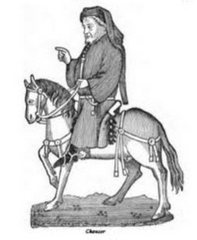
Geoffrey Chaucer
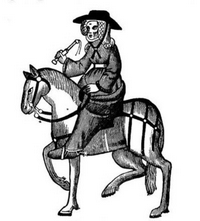
The Wife of Bath's Tale
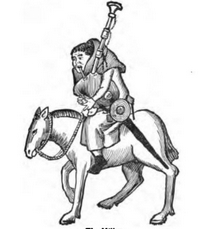
The Miller's Tale
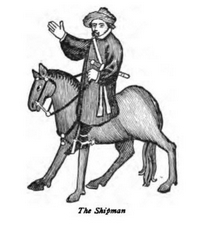
The Shipman's Tale
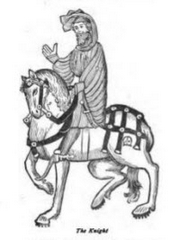
The Knight's Tale
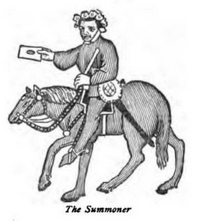
The Summoner's Tale
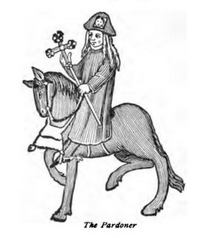
The Pardoner's Tale
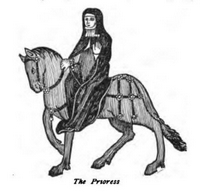
The Prioress's Tale
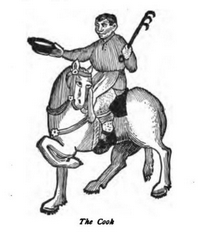
The Cook's Tale
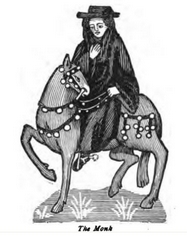
The Monk's Tale
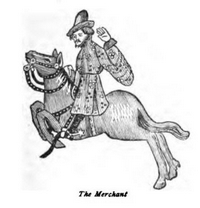
The Merchant's Tale
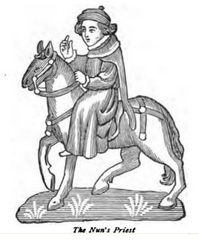
The Nun's Priest's Tale
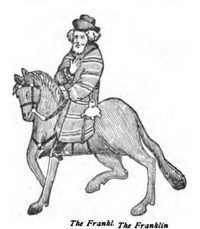
The Franklin's Tale
Main Page | Site Updates | Privacy Policy | Site Map | XML Map | RSS | Contact | About
Canterbury Tales
